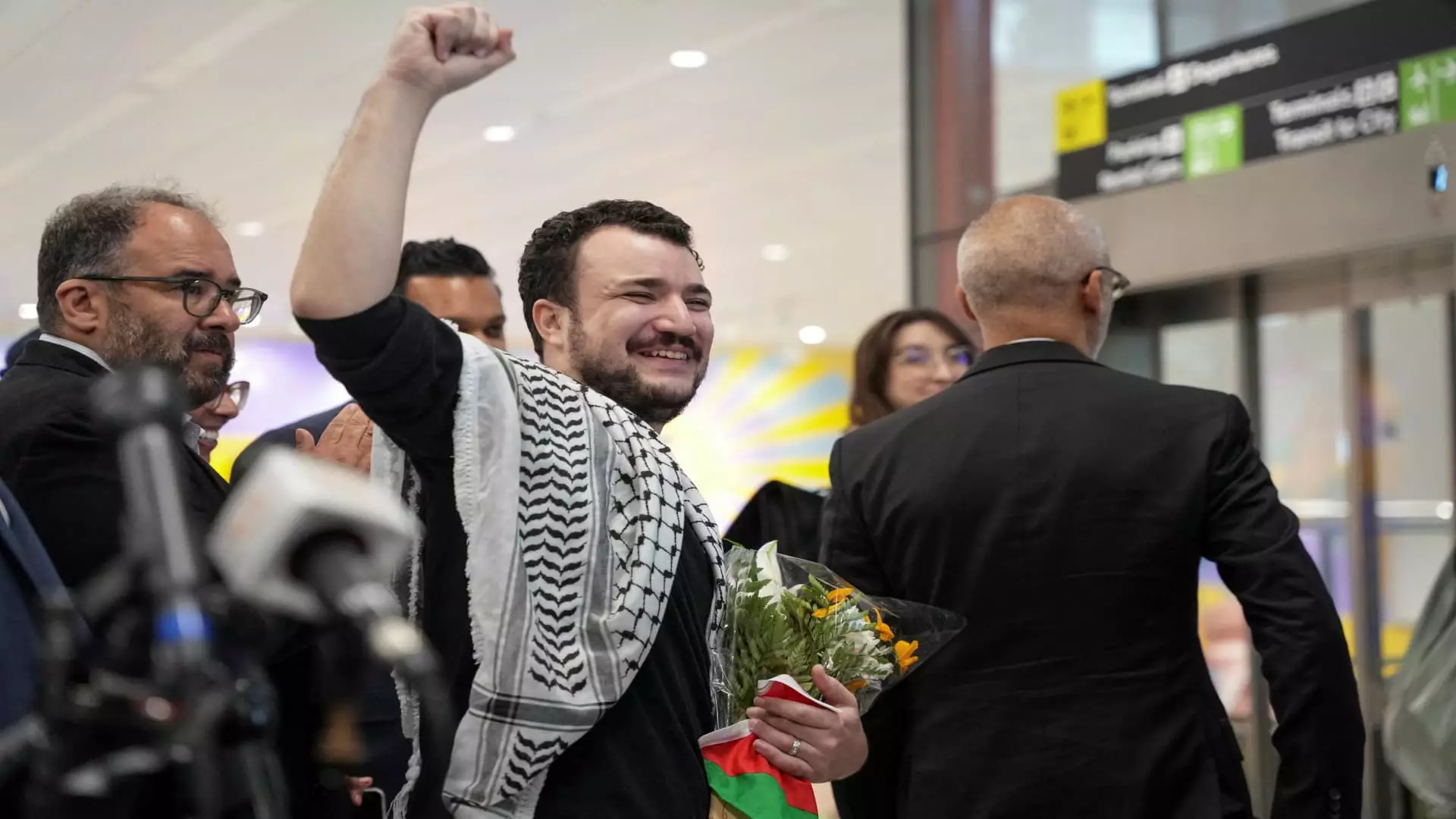In an alarming twist of events, the case of Mahmoud Khalil has captured the attention of activists and human rights advocates across the United States. A Columbia University student, Khalil’s fate shifted dramatically after he protested against systemic injustices and the ongoing genocide perpetrated in Gaza. Under the draconian measures of the Trump administration, he was detained for over three months, illustrating not just an attack on individual liberties but a chilling precedent for political dissent against this administration’s aggressive stance on international issues. This incident underscores a precarious reality: when dissent becomes synonymous with danger, democracy itself is put at risk.
A Battle Against Marginalization
During his detention at a facility far removed from his New York City home, Khalil became a focal point in a wider narrative that challenges the authority of the state and the legitimacy of its implications. Upon his release, he radiated defiance, declaring, “Your messages have kept me going,” suggesting that collective support was vital in keeping the flame of his activism alive. His assertion that “the genocide is still happening in Gaza” evokes a visceral response—he refuses to become a passive victim of oppression. Rather than stepping back, he has chosen to amplify his voice, recognizing how this political imprisonment is part of a concerted effort to silence pro-Palestinian sentiment in the United States. Khalil reminds us that the struggle for justice transcends personal trials, encompassing broader human rights violations that demand protest and resistance.
The Hypocrisy of National Security
The rationale provided by the Trump administration for Khalil’s detention—framed as a national security threat—represents a disingenuous narrative employed to justify authoritarian practices under the guise of protecting the public. Immigration and National Security authorities cited dubious claims, highlighting their reliance on tabloid reports rather than concrete evidence. This manipulation of national security as a tool for silencing dissent is not merely a reflection of policy; it represents a fundamental threat to the very principles of democracy that Americans profess to uphold. In Khalil’s words, “This is the message. My existence is a message.” He encapsulates the essence of resistance against state-led attempts to undermine individual rights through fear tactics.
The Politics of Fear
Khalil’s case is not isolated. It signifies a tipping point that reverberates through campuses and communities across America. The brutal tactics employed by immigration officials to enforce silence—reminiscent of totalitarian regimes—compel a reckoning about who is allowed to speak out and who must succumb to the weight of persecution. The escalation of arrests related to dissent not only targets individuals like Khalil but serves as an ominous warning to others who dare to voice their concerns over U.S. foreign policy. We must grapple with the notion that the very fabric of freedom is being frayed by the execution of such oppressive measures.
Rallying the Community
The collective outrage sparked by Khalil’s detention serves as a beacon of hope for those who refuse to remain silent. The presence of influential figures, including Congresswoman Alexandria Ocasio-Cortez, amplifies the urgent conversations surrounding free speech and responsible governance. The realities of Khalil’s imprisonment highlight a wider, systemic issue: the pressures facing pro-Palestinian voices and academic discourse is not just an isolated matter but one that invites scrutiny of the current political milieu. Khalil has illuminated a face of resistance; his journey signifies more than personal triumph; it encapsulates the growing impatience of a population that has been marginalized, silenced, and threatened.
The Broader Implications
While Khalil’s tale may seem to be an indictment against the current administration, it simultaneously heralds the emergence of an era where oppressed voices demand justice and accountability. As activists and community members continue to rally, the implications of such cases reach beyond the courts to influence public discourse. Khalil’s defiance sends ripples across college campuses, encouraging students, educators, and activists to rethink their roles in advocating for human rights without fear of reprisal. This defiance is emblematic of a generation that is unwilling to stand idly by as their fellow community members, regardless of nationality, face unwarranted persecution.
In this crucible of resistance, the narrative surrounding Khalil must be a call to action. As the political landscape continues to shift, the power of unity and collective dissent stands as the greatest counter to oppression. It becomes imperative that we not just engage but confront the systems that seek to silence voices and thwart justice. Khalil has become a symbol—his fight is undeniably intertwined with the broader struggle for equality, emphasizing that the fight against oppression is far from over.

Leave a Reply